#Colossians 1:26
Text
But Now
“But now” is an important method when it comes to understanding the Bible. If we straddle prophecy and mystery we will be unstable and doubleminded as things are different now to the way they once were in times past during Matthew, Mark, Luke & John.
During the time of Matthew, Mark, Luke and John the law (keeping the Sabbath, celebrating the feast days, adhering to a kosher diet, etc) wasn’t…
View On WordPress
#1 Corinthians 15:1-4#1 Timothy 2:4#2 Corinthians 5:19#But Now#Colossians 1:26#Dispensation of Grace#Galatians 2:20#Romans 6
0 notes
Text
Happy Transgender Day of Visibility in honor of El Roi, God Who Sees, who made all things, visible and invisible. We know a God of justice and protection, of vulnerability and truth, a God transfigured and transubstantiated, unashamed of scars, breaking gender roles, bringing resurrection. The God who loves us knows firsthand the rotten fruit of political oppression. They have commanded and blessed name changes. They are father and mother, beyond and encompassing our ideas of gender. To all my trans siblings: I am so lucky to know you, to see your God-given gifts, to be present in your joy. I pray today especially for those for whom visibility brings danger, and for those only fully seen by God. The Lord bless you and keep you. The Lord make his face to shine upon you and be gracious to you. The Lord look upon you with favor and give you peace. Amen.
#it is soooo scary right now in my country and i'm in your corner. i'm holding your hand and i love you so much#notes:#debate/disagreement/hot takes can go in my inbox please! not on this post#quoting Genesis 16:13 Colossians 1:16 and Numbers 6:24-26#for name changes see Abram/Abraham Jacob/Israel and Saul/Paul!#and no one ask me if I'm trans the answer is no but yes hope this helps 🙏
351 notes
·
View notes
Text

“Keeping In Step with Christ” This 1-minute devotion explains why Christ told us to take His YOKE and 4 ways we can make sure we're doing it:
We always get out of step when we try to bear our own burdens, solve our own problems, and operate in our own power.
We need a yoke* that connects us with Christ so we can move in step with Him:
“Come to me, all you who are weary and burdened, and I will give you rest. Take my yoke upon you and learn from me, for I am gentle and humble in heart, and you will find rest for your souls. For my yoke is easy and my burden is light.” (Matthew 11:28-30).
Yoked to Christ, we walk where He walks:
1. Dwelling on His Word:
“Let the message of Christ dwell among you richly” (Colossians 3:16a).
2. Rejecting popular worldly philosophies:
“See to it that no one takes you captive through hollow and deceptive philosophy, which depends on human tradition and the elemental spiritual forces of this world rather than on Christ” (Colossians 2:8).
3. Following His purposes:
“For we are God’s handiwork, created in Christ Jesus to do good works, which God prepared in advance for us to do” (Ephesians 2:10).
4. Walking in His power and strength:
“I can do all this through him who gives me strength” (Philippians 4:13).
Jesus says, "Whoever serves me must follow me; and where I am, my servant also will be" (John 12:26).
Best of all, when we move in step with Christ, we find rest for our souls.
-----------------
*Yoke: "zygós – properly, a yoke; a wooden bar placed over the neck of a pair of animals so they can pull together; (figuratively) what unites (joins) two people to move (work) together as one."
For a deeper understanding of taking Christ's yoke:
•Which yoke
•Yoked but unburdened
•Learn from Him
•Jesus invites us to come take and learn
•Come
(All Bible verses in the NIV.)
#1 minute bible love notes#bible study#keeping in step with christ#matthew 11:28 30#colossians 3:16#colossians 2:8#ephesians 2:10#philippians 4:13#john 12:26#biblestudy#the bible#bible reading#bible verses#bible scriptures#the word of god#christian blog#bible#god#belief in god#faith in god#jesus#belief in jesus#faith in jesus#encouragement#keep the faith#make him known#christian life#christian living#christian faith#christian inspirational quotes
26 notes
·
View notes
Text
"DON'T WAIT UNTIL THANKSGIVING TO THANK HIM!"
Read: 1 Chronicles 16:7-36
“O give thanks to the Lord, for He is good; for His mercy and loving-kindness endure forever” (1 Chronicles 16:34 AMP)
We often think of Gratitude in terms of Gain: Someone gives you a ride to work. A neighbor cooks a meal when you’ve had surgery. Your boss notices your hard work and gives you a raise. The kids clean up the house or your husband cooks dinner. For…

View On WordPress
#1 Chronicles 16:7-36#1 Thessalonians 5:18#Believers#Bible#Chef Shermaine#Church#Colossians 3:16-17#Encouragement#God#Grateful#Holy Spirit#Jesus Christ#Psalm 100:1-5#Psalm 103:1-2#Psalm 136:1-26#Quotes#Scripture#Thanksgiving#Word of God
2 notes
·
View notes
Text
Overcome Evil by The Spirit of The Lord (231) - February 3 2024
Play on other Podcast Apps
It is time to go around the mountain once more. We as the Body of Christ must learn to speak to the mountains in the world that need to be removed (Mark 11:23). There are mountains everywhere to be cast into the sea. Mountains of captivity for the souls in Afghanistan. Mountains of sickness and disease in people’s bodies. Mountains of lack. We can use the faith that…

View On WordPress
#1 Corinthians 3:9#2 Corinthians 4:4#christ#Colossians 2:12#father#Galatians 4:6#Genesis 1:26#Genesis 1:28#Genesis 3:6#god#Isaiah 61:1#Jesus#Mark 11:20-24#Mark 11:23#Matthew 10:1#Matthew 28:18-20#Revelations 19:11#Romans 10:9#Romans 12:3#Romans 4:17#yahweh#yeshua#Zechariah 4:6
0 notes
Text
9 ways to love
Listen without interrupting - Proverbs 18:13
Speak without accusing - James 1:19
Give without sparing - Proverbs 21:26
Pray without ceasing - Colossians 1:9
Answer without arguing - Proverbs 17:01
Promise without forgetting - proverbs 13:12
Enjoy without complaining - Philippians 2:14
Trust without wavering - Corinthians 13:7
Forgive without punishing - Colossians 3:13


#personal#catholic#catholiscism#love quotes#love#christian girl#christian faith#femininity#feminine#tradblr#tradwoman#trad wives#tradwife#traditional femininity#traditional gender roles#traditionalism#traditional family#personal development
749 notes
·
View notes
Text










Yellowjackets 2x07: Burial / NIV Bible (Matthew 5:39 - Zechariah 13:6 - Matthew 26:28 - Hebrews 9:22 - Colossians 1:20 )
#idk either guys bear with me lmao. but lottie jesus agenda has never been realer#yellowjackets#lottie matthews
557 notes
·
View notes
Text
how to read the Bible

this is in order!
1. John
2. Mark
3. Matthew
4. Luke
5. Genesis
6. Exodus
7. Leviticus
8. Numbers
9. Dueteronomy
10. Romans
11. Galatians
12. Colossians
13. Proverbs
14. Ecclesiastes
15. Job
16. 1 Peter
17. 1 Corinthians
18. 2 Corinthians
19. Ephesians
20. Philippians
21. 1 Thessalonians
22. 2 Thessalonians
23. 1 Timothy
24. 2 Timothy
25. James
26. 2 Peter
27. 1 John
28. 2 John
29. 3 John
30. Jude
31. Psalms
32. Joshua
33. Judges
34. 1 Samuel
35. 2 Samuel
36. 1 Kings
37. 2 Kings
38. 1 Chronicles
39. 2 Chronicles
40. Ezra
41. Nehemiah
42. Jeremiah
43. Lamentations
44. Ezekiel
45. Joel
46. Amos
47. Obadiah
48. Nahum
49. Habakkuk
50. Zephaniah
51. Haggai
52. Zechariah
53. Malachi
54. Micah
55. Hosea
56. Luke
57. Esther
58. Jonah
59. Song of Solomon
60. Acts
61. Titus
62. Philemon
63. Hebrew
64. Isaiah
65. Daniel
66. Revelation
86 notes
·
View notes
Text

Parable of the Prodigal Son:
Jesus conveyed a profound message about forgiveness, redemption, and the boundless love of God. Let's reframe the narrative within this Christian context, drawing from Luke 15:11-32, and infuse it with additional biblical insights.
A certain man had two sons. The younger son asked for his share of the inheritance and journeyed to a distant land where he squandered his wealth in reckless living. Soon, a severe famine swept through the land, and the young man found himself in dire need.
In his desperation, he sought employment feeding pigs, a job that symbolized his degradation and distance from his upbringing. Yet, in his lowest moment, he came to his senses and decided to return to his father, confessing his sins and seeking forgiveness.
His father, filled with compassion, ran to greet him while he was still far off. Instead of condemnation, the father embraced his wayward son, clothing him in the finest robe and celebrating his return with a lavish feast.
Meanwhile, the older son, who had remained obedient and dutiful, grew resentful at the extravagant welcome given to his brother. But the father, ever merciful, reminded him of the importance of forgiveness and reconciliation.
This parable echoes the essence of divine mercy and the unconditional love of God. Just as the father welcomed back his repentant son, so too does our Heavenly Father eagerly await our return, ready to forgive and restore us to fellowship with Him.
The Prodigal Son reminds us of the importance of humility, repentance, and forgiveness in our Christian journey. It challenges us to examine our attitudes towards others, particularly those who have strayed from the path, and to emulate God's boundless love and compassion.
Broader context:
Parable of the Prodigal Son (Luke 15:11-32):
This is the main passage where the parable is found.
Forgiveness and Reconciliation:
Matthew 18:21-22 - Jesus teaches about forgiveness.
Colossians 3:13 - Encouragement to forgive as the Lord forgave you.
Ephesians 4:32 - Be kind and compassionate, forgiving one another.
Luke 6:37 - Judge not, and you will not be judged; forgive, and you will be forgiven.
God's Unconditional Love:
Romans 8:38-39 - Nothing can separate us from the love of God.
1 John 4:16 - God is love, and whoever abides in love abides in God.
Romans 5:8 - God shows his love for us in that while we were still sinners, Christ died for us.
Ephesians 2:4-5 - But God, being rich in mercy, because of the great love with which he loved us, even when we were dead in our trespasses, made us alive together with Christ.
Repentance and Restoration:
Acts 3:19 - Repent therefore, and turn back, that your sins may be blotted out.
Joel 2:13 - Return to the Lord your God, for he is gracious and merciful, slow to anger, and abounding in steadfast love.
Isaiah 55:7 - Let the wicked forsake his way, and the unrighteous man his thoughts; let him return to the Lord, that he may have compassion on him, and to our God, for he will abundantly pardon.
2 Corinthians 5:17 - Therefore, if anyone is in Christ, he is a new creation. The old has passed away; behold, the new has come.
Celebration in Heaven over Repentance:
Luke 15:7 - Just so, I tell you, there will be more joy in heaven over one sinner who repents than over ninety-nine righteous persons who need no repentance.
Luke 15:10 - Just so, I tell you, there is joy before the angels of God over one sinner who repents.
God's Provision and Restoration:
Philippians 4:19 - And my God will supply every need of yours according to his riches in glory in Christ Jesus.
Psalm 23:1 - The Lord is my shepherd; I shall not want.
Matthew 6:26 - Look at the birds of the air: they neither sow nor reap nor gather into barns, and yet your heavenly Father feeds them. Are you not of more value than they?
God's Sovereignty and Compassion:
Psalm 103:8 - The Lord is merciful and gracious, slow to anger and abounding in steadfast love.
Lamentations 3:22-23 - The steadfast love of the Lord never ceases; his mercies never come to an end; they are new every morning; great is your faithfulness.
James 5:11 - Behold, we consider those blessed who remained steadfast. You have heard of the steadfastness of Job, and you have seen the purpose of the Lord, how the Lord is compassionate and merciful.
Questions:
How does the parable of the Prodigal Son reflect God's unconditional love and forgiveness?
In what ways do we, like the older brother, struggle with forgiveness and harbor resentment towards others?
How can we cultivate a spirit of compassion and reconciliation in our interactions with those who have gone astray?
What steps can we take to emulate the father's example of mercy and grace in our daily lives?
Let us pray:
Heavenly Father, we thank you for the timeless wisdom and grace revealed in the parable of the Prodigal Son. Teach us to extend forgiveness, show compassion, and embrace reconciliation in our relationships, reflecting your boundless love for all your children. Amen.
#ProdigalSon#DivineMercy#Forgiveness#UnconditionalLove#Redemption#Parable#ChristianTeaching#Compassion#Reconciliation#HeavenlyFather#Grace#Mercy#BiblicalWisdom#christianity#christian faith#faith#jesus christ#bible verse#christianlife#faith in jesus#bible scripture#bible#christ#christianty#bible study#salvation#bible quote
20 notes
·
View notes
Text


The άνάλαβος (analavos) is the distinctive garment of a monk or a nun tonsured into the highest grade of Orthodox monasticism, the Great Schema, and is adorned with the instruments of the Passion of Christ. It takes its name from the Greek αναλαμβάνω (“to take up”), serving as a constant reminder to the one who wears it that he or she must “take up his cross daily” (Luke 9:23). The ornately-plaited Crosses that cover the analavos, the polystavrion (πολυσταύριον, from πολύς, “many,” and σταυρός, “Cross”) — a name often, though less accurately, also applied to the analavos — reminds the monastic that he or she is “crucified with Christ” (Galatians 2:20).
With regard to each image on the analavos, the rooster represents “the cock [that] crowed” (Matthew 26:74; Mark 14:68 Luke 22:60; John 18:27) after Saint Peter had “denied thrice” His Master and Lord (John 13:38).
The pillar represents the column to which Pilate bound Christ “when he scourged Him” (Mark 15:15) “by Whose stripes we were healed” (Isaiah 53:5; I Peter 2:24).
The wreath garlanding the Cross represents the “crown of thorns” (Matthew 27:29; Mark 15:17; John 19:2) that “the soldiers platted” (John 19:2) and “put upon the head” (Matthew 27:29) of “God our King of old” (Psalm 73:13), Who freed man from having to contend against “thorns and thistles in the sweat of his brow” (Genesis 3:18-19).
The upright post and the traverse beam represent the stipes and the patibulum that formed “the Cross of our Lord Jesus Christ” (Galatians 6:14), upon which “all day long He stretched forth His hands unto a disobedient and gainsaying people” (Isaiah 65:2; Romans 10:21).
The four spikes at the center of the Cross and the hammer beneath its base represent the “nails” (John 20:25) and hammer with which “they pierced” (Psalm 21:16; John 19:37) “His hands and His feet” (Luke 24:40). when they “lifted up from the earth” (John 12:32) Him Who “blotted out the handwriting of ordinances that was against us by nailing it to His Cross” (Colossians 2:14).
The base upon which the Cross stands represents “the place, which is called 'Calvary' (Luke 23:33), or 'Golgotha', that is to say, the Place of the Skull” (Matthew 27:33), “where they crucified Him” (John 19:18) Who “wrought salvation in the midst of the earth” (Psalm 73:13).
The skull and crossbones represent “the first man Adam” (I Corinthians 15:45), who by tradition “returned unto the ground” (Genesis 3:19) at this very spot, the reason that this place of execution, “full of dead men’s bones” (Matthew 23:27) became the place where “the last Adam was made a quickening spirit” (I Corinthians 15:45).
The plaque on top of the Cross represents the titulus, the “title” (John 19:19-20), with “the superscription of His accusation” (Mark 15:26), which “Pilate wrote” (John 19:19) “and set up over His head” (Matthew 27:37); however, instead of “Jesus of Nazareth the king of the Jews” (John 19:19), which “was written over Him in letters of Greek, and Latin, and Hebrew” (Luke 23:38), the three languages being an allusion to the Three Hypostases “of the Father, and of the Son, and of the Holy Spirit” (Matthew 28:19), this titulus reads, “The King of Glory” (Psalm 23:7-10), “for had they known it they would not have crucified the Lord of glory” (I Corinthians 2:8).
The reed represents the “hyssop” (John 19:29) upon which was put “a sponge full of vinegar” (Mark 15:36), which was then “put to His mouth” (John 19:29) when in His “thirst they gave Him vinegar to drink” (Psalm 68:21), Him of Whom it was said that “all wondered at the gracious words which proceeded out of His mouth” (Luke 4:22).
The lance represents the “spear [that] pierced His side”; “and forthwith came there out blood and water” (John 19:34) from Him Who “took one of Adam's ribs, and closed up the flesh instead thereof" (Genesis 2:21) and Who “washed us from our sins in His own blood” (Revelation 1:5).
The plaque at the bottom of the Cross represents the suppedaneum of Christ, “His footstool” (Psalm 98:5), “the place where His feet have stood” (Psalm 131:7). It is slanted because, according to one tradition, at the moment when “Jesus cried with a loud voice, and gave up the spirit” (Mark 15:37), He allowed a violent death spasm to convulse His legs, dislodging His footrest in such a manner that one end pointed upwards, indicating that the soul of the penitent thief, Saint Dismas, “the one on His right hand” (Mark 15:27) would be “carried up into Heaven” (Luke 24:51), while the other end, pointed downwards, indicated that the soul of the impenitent thief, Gestas, “the other on His left” (Mark 15:27), would “be thrust down to Hell” (Luke 10:15), showing that all of us, “the evil and the good, the just and the unjust” (Matthew 5:45), “are weighed in the balance” (Ecclesiasticus 21:25) of the Cross of Christ.
The ladder and the pincers beneath the base of the Cross represent the means of deposition by which Saint Joseph of Arimathea, “a rich man” (Matthew 27:57) who “begged for the body of Jesus” (Matthew 27:58; Luke 23:52), “took it down” (Luke 23:53), so that as in body He descended from the Cross, so in soul “He also descended first into the lower parts of the earth” (Ephesians 4:9), “by which also He went and preached unto the spirits in prison” (I Peter 3:19).
Through these instruments, “the Cross of Christ” (I Corinthians 1:17: Galatians 6:12; Philippians 3:18) became the “Tree of Life” (Genesis 2:9; 3:22, 24; Proverbs 3:18, 11:30; 13:12; 15:4; Revelation 2:7; 22:2,14), by which the Lord Jesus reified His words that, “I am the resurrection, and the life: he that believeth in Me, though he were dead, yet shall he live, and whosoever liveth and believeth in Me shall never die” (John 11:25-26).
[source]
17 notes
·
View notes
Text
The Gospel
What It Means to Be a Christian
Being a Christian is more than identifying yourself with a particular religion or affirming a certain value system. Being a Christian means you have embraced what the Bible says about God, mankind, and salvation. Consider the following truths found in the Bible.
God Is Sovereign Creator
Contemporary thinking says man is the product of evolution. But the Bible says we were created by a personal God to love, serve, and enjoy endless fellowship with Him. The New Testament reveals it was Jesus Himself who created everything (John 1:3; Colossians 1:16). Therefore, He also owns and rules everything (Psalm 103:19). That means He has authority over our lives and we owe Him absolute allegiance, obedience, and worship.
God Is Holy
God is absolutely and perfectly holy (Isaiah 6:3); therefore He cannot commit or approve of evil (James 1:13). God requires holiness of us as well. First Peter 1:16 says, You shall be holy, for I am holy.
Mankind Is Sinful
According to Scripture, everyone is guilty of sin: There is no man who does not sin (1 Kings 8:46). That doesn't mean we're incapable of performing acts of human kindness. But we're utterly incapable of understanding, loving, or pleasing God on our own (Romans 3:10-12).
Sin Demands a Penalty
God's holiness and justice demand that all sin be punished by eternal death (Ezekiel 18:4; Romans 6:23). That's why simply changing our patterns of behavior can't solve our sin problem or eliminate its consequences.
Jesus Is Lord and Savior
Romans 10:9 says, If you confess with your mouth Jesus as Lord, and believe in your heart that God raised Him from the dead, you shall be saved. Even though God's justice demands death for sin, His love has provided a Savior who paid the penalty and died for sinners (1 Peter 3:18). Christ's death satisfied the demands of God's justice, and Christ's perfect life satisfied the demands of God's holiness (2 Corinthians 5:21), thereby enabling Him to forgive and save those who place their faith in Him (Romans 3:26).
The Character of Saving Faith
True faith is always accompanied by repentance from sin. Repentance is agreeing with God that you are sinful, confessing your sins to Him, and making a conscious choice to turn from sin (Luke 13:3, 5; 1 Thessalonians 1:9), pursue Christ (Matthew 11: 28-30; John 17:3), and obey Him (1 John 2:3). It isn't enough to believe certain facts about Christ. Even Satan and his demons believe in the true God (James 2:19), but they don't love and obey Him. True saving faith always responds in obedience (Ephesians 2:10).
Source: https://www.gracechurch.org/about/gospel
24 notes
·
View notes
Text
[Maintaining A Clear Conscience]
Believers in Christ must strive to maintain a clear conscience: we must remove any pollution or defilement in our minds, hearts, and souls. That includes being cautious of what we say (Matthew 15:11), what we hear—practically anything NEGATIVE our soul absorbs, which can pollute it. And whatever we absorb can cause us to behave in a not so pleasing way to God (Romans 12:1).
This can happen without us being aware. For instance, if you run to the internet to answer your questions and to solve your problems, instead of God’s truth, you’re not going to have peace because the world is full of lies and ruled by spirits of darkness (Ephesians 6:12).
“We know that we are children of God, and that the whole world is under the control of the evil one.”
-1 John 5:19
These are deceiving spirits who want to take our focus off God and drag us down. They want us to feel as if there is no hope. It’s all a distraction.
The devil will use our emotions to toy with us. Therefore, trusting other sources, our hearts, and people instead of God and His word will only birth fear, paranoia, and anxiety, which are not fruits of the spirit (Galatians 5:22-23).
Not only that, the human heart is deceitful (Jeremiah 17:9). And as Proverbs 28:26 says: “He who trusts in his own heart is a fool, but he who walks in wisdom will escape.”
As Believers, this will only make us stumble and our faith wobble. That is why we need to root ourselves in God and in His word.
“They will be like a tree planted by the water that sends out its roots by the stream. It does not fear when heat comes; its leaves are always green. It has no worries in a year of drought and never fails to bear fruit.”
-Jeremiah 17:8
<Extra Verses>
“It is better to trust in the Lord than to put confidence in man. It is better to trust in the Lord than to put confidence in princes.”
Psalm 118:8-9
“Don’t put your trust in mere humans. They are as frail as breath. What good are they?”
-Isaiah 2:22
“Fools believe every word they hear, but wise people think carefully about everything.”
-Proverbs 14:15
<Bonus Verses>
“Finally, brothers and sisters, whatever is true, whatever is noble, whatever is right, whatever is pure, whatever is lovely, whatever is admirable—if anything is excellent or praiseworthy—think about such things. Whatever you have learned or received or heard from me, or seen in me—put it into practice. And the God of peace will be with you.”
-Philippians 4:8-9
“Do not be anxious about anything, but in every situation, by prayer and petition, with thanksgiving, present your requests to God. And the peace of God, which transcends all understanding, will guard your hearts and your minds in Christ Jesus.”
-Philippians 4:6-7
“We demolish arguments and every pretension that sets itself up against the knowledge of God, and we take captive every thought to make it obedient to Christ.”
-2 Corinthians 10:5
“My thoughts are nothing like your thoughts,” says the Lord. “And my ways are far beyond anything you could imagine. For just as the heavens are higher than the earth, so my ways are higher than your ways and my thoughts higher than your thoughts.
-Isaiah 55:8-9
“Don’t become so well-adjusted to your culture that you fit into it without even thinking. Instead, fix your attention on God. You’ll be changed from the inside out. Readily recognize what he wants from you, and quickly respond to it. Unlike the culture around you, always dragging you down to its level of immaturity, God brings the best out of you, develops well-formed maturity in you.”
-Romans 12:2
“You will keep in perfect peace all who trust in you, all whose thoughts are fixed on you!”
-Isaiah 26:3
“Set your minds on things above, not on earthly things.”
-Colossians 3:2
#christian#bible verse#christianity#bibleverse#jesus christ#jesus loves you#faith in god#faith in jesus#follower of jesus christ#god
10 notes
·
View notes
Text

“Hidden but Not Hidden” By Bible Love Notes:
“Psalm 119:11 says: “I have hidden your word in my heart that I might not sin against you.”
In this verse, hidden doesn't mean concealing God's Word. It means storing it up and treasuring it in our hearts.
If you read all 176 verses of Psalm 119, you'll discover many ways that the psalmist hid God's Word in his heart. For example:
Psalm 119:9-16: “How can a young person stay on the path of purity? By living according to your word. 10 I seek you with all my heart; do not let me stray from your commands. 11 I have hidden your word in my heart that I might not sin against you. 12 Praise be to you, LORD; teach me your decrees. 13 With my lips I recount all the laws that come from your mouth. 14 I rejoice in following your statutes as one rejoices in great riches. 15 I meditate on your precepts and consider your ways. 16 I delight in your decrees; I will not neglect your word.”
In these verses, the psalmist hides God's Word by:
1. Obeying it – verse 9. “But don’t just listen to God’s word. You must do what it says. Otherwise, you are only fooling yourselves. For if you listen to the word and don’t obey, it is like glancing at your face in a mirror. You see yourself, walk away, and forget what you look like. But if you look carefully into the perfect law that sets you free, and if you do what it says and don’t forget what you heard, then God will bless you for doing it.” —James 1:22-25 (NLT)
2. Seeking God in it – verse 10. “But seek first the kingdom of God and His righteousness, and all these things shall be added to you.” —Matthew 6:33 (NKJV)
3. Studying it with the Spirit's help – verse 12. “But the Helper, the Holy Spirit, whom the Father will send in My name, He will teach you all things, and bring to your remembrance all things that I said to you.” —John 14:26 (NKJV)
4. Reciting it – verse 13. “Let the message about Christ, in all its richness, fill your lives. Teach and counsel each other with all the wisdom he gives. Sing psalms and hymns and spiritual songs to God with thankful hearts.” —Colossians 3:16 (NLT)
5. Enjoying it – verse 14. “The commandments of the Lord are right, bringing joy to the heart. The commands of the Lord are clear, giving insight for living.” —Psalm 19:8 (NLT)
6. Meditating on it – verse 15. “Finally, brethren, whatever things are true, whatever things are noble, whatever things are just, whatever things are pure, whatever things are lovely, whatever things are of good report, if there is any virtue and if there is anything praiseworthy—meditate on these things.” —Philippians 4:8 (NKJV)
7. Spending time regularly in it – verse 16. “—”Study and do your best to present yourself to God approved, a workman [tested by trial] who has no reason to be ashamed, accurately handling and skillfully teaching the word of truth.” —2 Timothy 2:15 (AMP)
Are you “hiding” God's Word in your heart?”
[Click here for more links to devotionals.]
#psalm 119:9-16#james 1:22-25#matthew 6:33#john 14:26#colossians 3:16#psalm 19:8#philippians 4:8#2 timothy 2:15#bible#christian blog#god#belief in god#faith in god#jesus#belief in jesus#faith in jesus#bible verses#bible truths#bible scriptures#bible quotes#bible study#the word of god#spread the word#the word#christian life#christian living#christian faith#christian encouragement#christian inspiration#christianity
17 notes
·
View notes
Text
"THE CROSS DISARMED SATAN"
Colossians 2:11-15, “In Him also you were circumcised with a circumcision not made with hands, but in a [spiritual] circumcision [performed by] Christ by stripping off the body of the flesh (the whole corrupt, carnal nature with its passions and lusts). [Thus you were circumcised when] you were buried with Him in [your] baptism, in which you were also raised with Him [to a new life] through…

View On WordPress
#1 Corinthians 15:55-57#1 Peter 5:8#2 Timothy 1:10#Believers#Bible#Chef Shermaine#Church#Colossians 1:14-15#Colossians 2:11-15#Cross#Encouragement#Ephesians 4:27#Ephesians 6:11-18#God#Hebrews 12:23#Hebrews 5:7#Holy Spirit#Jesus Christ#John 10:10#John 11:25-26#John 8:44#Resurrection#Revelation 12:11#Romans 6:1-14#Romans 8:2#Scripture#Word of God
1 note
·
View note
Text
Extrication of Your Blinded Soulfrom Darknessby Faith in Christ Jesus (223) - December 9 2023
Play on other Podcast Apps
God the Father rescues us out from under the powers of darkness when we the ultimate decision to make Jesus our choice. Our acceptance and desire to receive Him as our Savior and Lord. We also talk about how faith played a central role in our believing in the person of Christ Jesus by faith, since we were not around to witness His Life on earth and the ultimate…

View On WordPress
#christ#Colossians 1:13-14#Ephesians 1:3#Ephesians 2:4-5#father#Galatians 3:26-28#god#Hebrews 11:1#Jesus#Romans 10:9-10#yahweh#yeshua
0 notes
Text
We are the salt of the earth
Matthew 5:13 Ye are the salt of the earth: but if the salt have lost his savour, wherewith shall it be salted? it is thenceforth good for nothing, but to be cast out, and to be trodden under foot of men.
Interesting facts about salt (Sodium Chloride) aside from the well known
fact that It flavors food and is used as a binder and stabilizer , and a food preservative , bacteria can't thrive in the presence of a high amount of salt (because of the process of osmosis ). Salt also has healing properties.
Colossians 4:6 Let your speech be always with grace, seasoned with salt, that ye may know how ye ought to answer every man.
Proverbs 16:24 Pleasant words are as an honeycomb, sweet to the soul, and health to the bones.
Proverbs 10:21 The lips of the righteous feed many: but fools die for want of wisdom.
Job 6:6 Can that which is unsavoury be eaten without salt? or is there any taste in the white of an egg?
Mark 9:49 For every one shall be salted with fire, and every sacrifice shall be salted with salt.9:50 Salt is good: but if the salt have lost his saltness, wherewith will ye season it? Have salt in yourselves, and have peace one with another.
2 Kings 2:19 And the men of the city said unto Elisha, Behold, I pray thee, the situation of this city is pleasant, as my lord seeth: but the water is naught, and the ground barren.2:20 And he said, Bring me a ("new" cruse), and put salt therein. And they brought it to him.
Cruse is a cup or a flask a new vessel if you will.
1 Samuel 26:11 The LORD forbid that I should stretch forth mine hand against the LORD's anointed: but, I pray thee, take thou now the spear that is at his bolster, and the cruse of water, and let us go.
2 Timothy 2:21 If a man therefore purge himself from these, he shall be a vessel unto honour, sanctified, and meet for the master's use, and prepared unto every good work.
2 Kings 2:21 And he went forth unto the spring of the waters, and cast the salt in there, and said, Thus saith the LORD, I have healed these waters; there shall not be from thence any more death or barren land.2:22 So the waters were healed unto this day, according to the saying of Elisha which he spake.
It is God's presence that preserves us and keeps us from corruption! It was salt that this city needed just like It is salt (God's life) that we require.
Psalm 121:7 The LORD shall preserve thee from all evil: he shall preserve thy soul.
#sermon#biblical scripture#bible#jesus#faith in jesus#jesus christ#bible verse#bible scripture#holy bible
7 notes
·
View notes